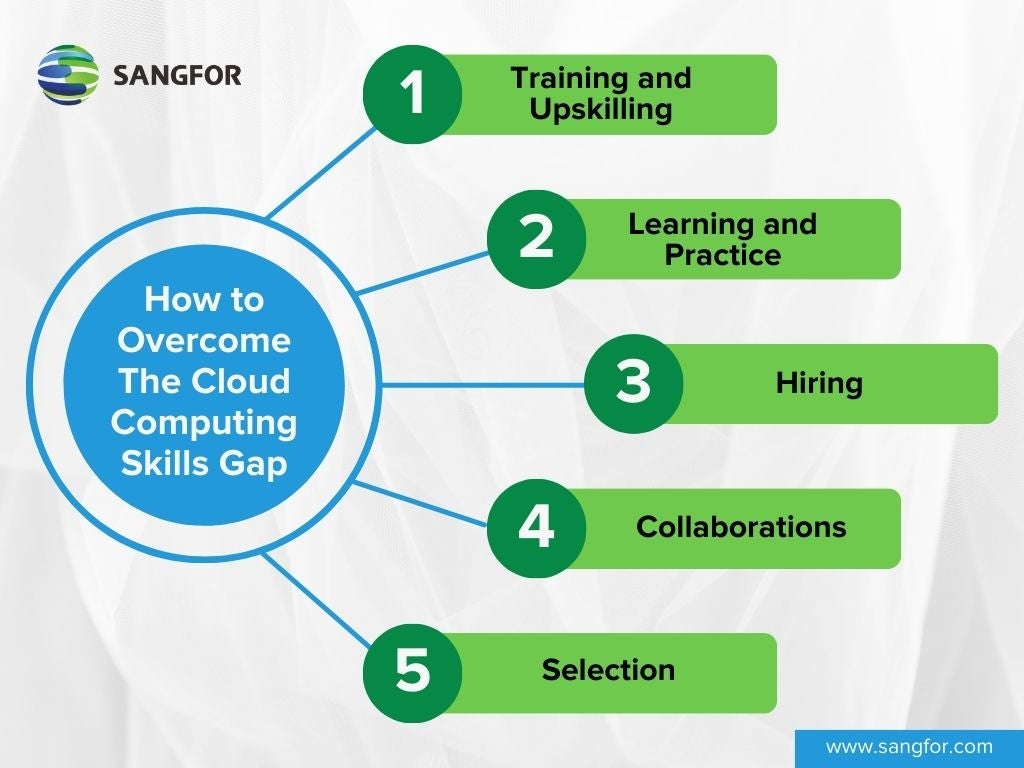The Cloud Computing Skills Gap
Ever since its inception, Cloud Computing has proven highly beneficial to businesses looking for flexibility in their IT operations. Cloud services offer impressive scalability, agility, cost-effectiveness, and wide accessibility. The demand for the cloud is at an all-time high, with businesses planning to migrate their applications and data from on-premises data centers to the cloud. According to Gartner, the spending on public cloud alone is expected to reach 600 billion US dollars by 2024.
Hyperscalers like Microsoft Azure and Amazon Web Services (AWS) leave no space in offering innovative features at attractive cost models, prompting businesses to migrate to the cloud. However, cloud migration is moving at a slower pace than expected. One of the main stumbling blocks is the cloud computing skills gap. Take a look at the following statistics.
- According to Statista, over 85% of the surveyed IT decision-makers expressed that the lack of skills and expertise in cloud operations has somehow or significantly impacted the company’s abilities to achieve its business goals.
- About 44% of the respondents replied that there is difficulty in finding quality candidates for hiring when asked about the significant challenges organizations face when they try to address the cloud skills gap in an S&P Global survey.
- A survey of 500 IT decision-makers by Vanson Bourne shows that nearly 98% of global organizations surveyed are facing a cloud skills gap.
It is painstakingly evident that skills and expertise lag behind the growing cloud innovations, driven largely by the latest technologies like artificial intelligence and machine learning. Human resources are unable to keep up with the developments, and organizations face several challenges because of the cloud skills gap when migrating to hyperscale clouds.

Cloud Computing Skills for Cloud Adoption
Before addressing the skills gap, here are some cloud computing skills required to facilitate an efficient cloud migration.
Architecture and Design
One of the main skills needed for cloud migration is understanding how to design scalable and resilient architectures in the cloud, utilizing services provided by hyperscaler providers. This requires cloud professionals to be well aware of various hyperscaler landscapes and best cloud practices. In addition, IT professionals should be able to leverage automation tools to streamline processes, deploy resources efficiently, and ensure consistency in the cloud environment.
Networking Skills
Cloud computing professionals need to have an in-depth understanding of cloud networking concepts, including virtual networks and their configuration, and implementing secure and efficient connectivity between on-premises and cloud environments. They should be well-versed in subnetting, IP addressing, load balancing, firewall configuration, and network optimization. These are just a few skills to ensure efficient networking within the cloud.
Cloud Security
In times of increasing cyber security threats, cloud security is an inevitable task that organizations need to focus on. To ensure data protection and security, they must implement and maintain robust security measures, such as endpoint security, encryption, identity and access management, data backup, and recovery. All these measures require a profound knowledge of clouds and potential risks as well as skills to mitigate these threats on time to avoid huge losses.
Platform-Specific Skills
There are many hyperscalers such as AWS, Microsoft Azure, and Google Cloud Platform, available in the market. All these platforms differ in their offerings, features, and capabilities.
Organizations require deep knowledge of these platforms' services and best practices that cater to their needs. They need to be familiar with the management consoles, command-line interfaces (CLIs), and APIs of the chosen hyperscaler.
Problem Solving and Troubleshooting
An organization's IT team should possess strong problem-solving skills to address issues related to cloud migration, performance, and availability. To handle issues arising from cloud adoption and management, IT professionals need to be highly knowledgeable and experienced.
Data Management
An organization’s IT team needs to be experienced in migrating and managing data in the cloud, which again requires in-depth acumen in data storage solutions, databases, and data transfer services. In case of disasters or failures, they should efficiently handle data encryption, backup, and recovery.
Miscellaneous Skills
In addition to technical skills, IT teams need to be familiar with cost management practices, regulatory requirements, and governing policies for compliance regulations in various countries. Continuous learning is a must to enhance collaboration, automate and optimize workflows, and facilitate rapid and reliable application deployment in the cloud environment.
Overcoming Cloud Computing Skills Shortage: Strategies and Techniques
While organizations need to master many skills and expertise for smooth cloud migration, here are a few ways to help bridge the skills gap.

- Training and Upskilling: Organizations can invest in both internal and external training programs to upskill their existing employees. Internal programs can include online training and certification programs related to cloud technologies. They can encourage their employees to participate and engage in external events like workshops, webinars, and conferences offered by cloud experts.
- Learning and Practice: While training programs offer theoretical knowledge, organizations need to put it into practice for hands-on exposure. Employees can participate in competitions and mentorship programs from industry experts. Organizations can continue encouraging their employees to get more practice by introducing incentive systems, specifically designed for learning and practice.
- Hiring: One quick way to plug the cloud computing skills gap is to hire talents who are already experts with impressive experience. Organizations that do not want to be involved in training their existing workforce can instead recruit talents equipped with cloud expertise. But often, this easily becomes a tiring and expensive affair as it is very difficult to find talents that perfectly fit the organization’s needs.
- Collaborations: Organizations can partner with specialized consulting firms or managed service providers to fulfill their cloud computing needs. These firms, besides providing managed cloud services, also offer their expertise in the form of resources like documentation, webinars, and workshops.
- In addition, they can collaborate with universities and colleges to educate students on the cloud at an academic level, creating a talent pool pipeline.
- Selection: Organizations can choose solutions that are easy and intuitive to learn and use. Instead of investing in multiple solutions, it is better to choose user-friendly solutions developed by a single company that offers multiple benefits. Besides being both effective and innovative, these solutions will reduce the time and costs required for IT professionals to adapt.
The Best Way to Bypass Cloud Computing Skills Shortage: Managed Cloud Services
Instead of spending a lot on finding and hiring an in-house cloud operations and management team, organizations can consider leveraging managed cloud services. A great alternative to bypass the skills gap, managed service providers offer expertise in cloud management, allowing organizations to focus on their core business functions.
This means these service providers take over partial or complete management and control of cloud-related operations like migration, maintenance, and security. This approach provides access to a talent pool while eliminating the need to bridge the cloud computing skills gap. Most managed cloud services include IT tasks, operation management, and 24/7 help desk support.
Effectively Tackling Cloud Skills Shortage: Sangfor Managed Cloud Service (MCS)
To help organizations overcome the cloud computing skills gap, Sangfor has introduced Managed Cloud Service (MCS). Sangfor MCS gives customers the convenience and flexibility of a public cloud, with the security, control, and professional service of a private cloud. It is a perfect solution for small and medium enterprises (SMEs) that often struggle to find talent to reap the benefits of cloud solutions.
By providing a one-stop-shop experience to organizations, Sangfor MCS provides a full range of in-house technologies. They benefit from superior compute, storage, network, backup, disaster recovery (DR), and hybrid cloud as well as endpoint security, assessment service, and managed security service. All benefits are in one solution without having to need an entire team to manage individual software for computing, storage, and networking.
Why Choose Sangfor Managed Cloud Service (MCS)
Besides the strong capabilities of Data Compliance, Effective Security, and Tailored Service, Sangfor MCS offers the following benefits:
- Focus enhancing: With Sangfor MCS, organizations can forget their worries about finding, hiring, and training the right talent for cloud operation and management. Sangfor MCS effectively eliminates the aforementioned talent needs, letting organizations fully focus on their core business goals to deliver greater value.
- Tailor-made Solution: Sangfor designed MCS by taking into consideration the challenges faced by organizations when it comes to cloud adoption. It is an incredible solution for SMEs with limited resources to build and manage their own cloud but want to enjoy the benefits of cloud computing.
- New Security Responsibility Model: Sangfor MCS offers world-class security to organizations by offering cloud-native security capabilities, including full protection for critical applications and data and continuous updates to security capabilities and technology. Additionally, Sangfor MCS takes responsibility for protecting up to 80% of your cloud business, including your data and applications, compared to hyperscalers that typically only take responsibility for securing the underlying infrastructure.
- Optimal TCO: Sangfor MCS reduces TCO by up to 40% when compared with other public cloud infrastructure services or hyperscalers. This is achieved through a combination of attractive pricing models, no hidden costs, lower operations overhead due to simplified architecture and short learning curve, and integrated features.
In Conclusion
Cloud adoption is increasingly becoming a crucial linchpin for organizations to fulfill their business needs amid the dynamic landscape of changing customer needs and technologies. But often, organizations fall short of cloud computing skills to manage and maintain their cloud operations. Managed Cloud Services like Sangfor MCS bridge the skills gap while seamlessly providing the benefits of cloud adoption.
With Sangfor MCS, organizations do not need a specialized IT team to oversee their cloud operations. This allows them to focus on more important business aspects. To learn more about Sangfor MCS, please visit our official website www.sangfor.com, or reach out to us on our social media channels.





